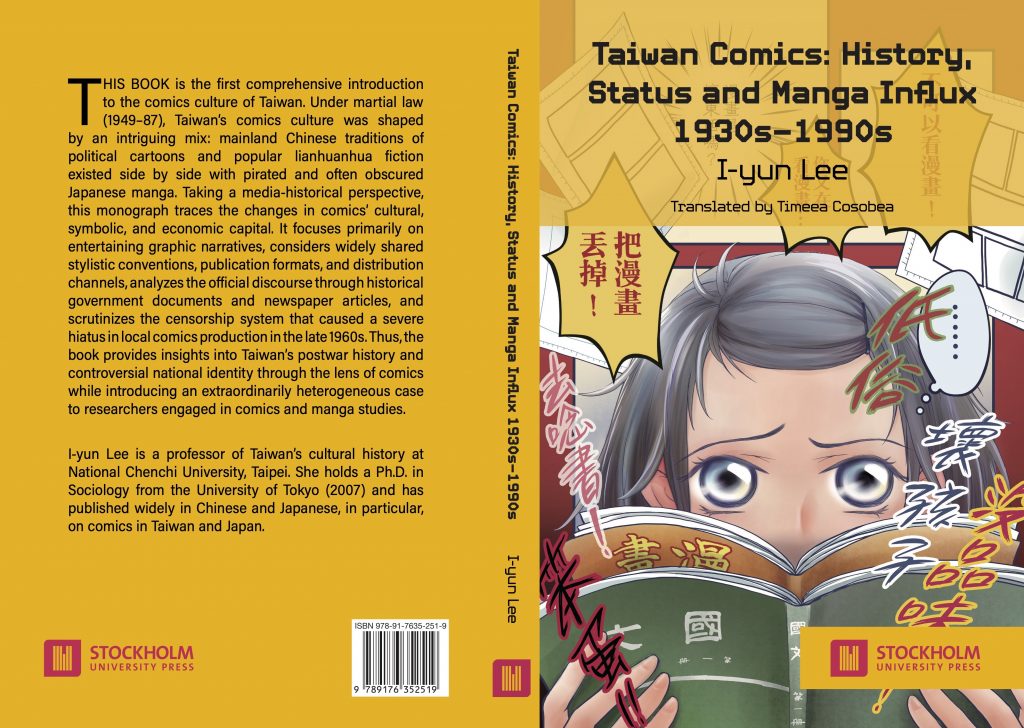in Christina Meyer, Vanessa Ossa & Lukas R.A. Wilde (Hg.): Was war, ist, wird Comicforschung – für uns? 10 Jahre ComFor e.V. als eingetragener Verein Gesellschaft für Comicforschung (ComFor), 2024, S. 32–38. Open Access. http://10.17605/OSF.IO/PDWFH
Tag: open access
Taiwan Comics: History, Status, and Manga Influx 1930s – 1990s (2024)
by I-yun LEE
part of open access book series Stockholm Studies in Media Arts Japan
https://www.stockholmuniversitypress.se/site/books/m/10.16993/bcp/

Book: Introduction – “Anime Studies” (2021–23)
Anime Studies: Media-Specific Approaches to Neon Genesis Evangelion, ed. by José Andrés Santiago Iglesia and Ana Soler Baena, Stockholm UP, 2021. 978-9-176-35167-3
2nd title in Open Access book series
“Stockholm Studies in Media Arts Japan” (SMAJ)
JB, Introduction, pp. 1–18.
[Polish trans.] 2022_“Anime studies: Wprowadzenie,” Polish transl. by Anna Ratkiewicz, Panoptikum Nr 28 (2022): Serialowa Azja, 118–133.
https://doi.org/10.26881/pan.2022.28.07
[Spanish trans.] 2023__“Introducción,” Estudios de Anime. Aproximaciones a Neon Genesis Evangelion desde una perspectiva de medios, ed. José Andrés Santiago Iglesias, Ana Soler Baena, Gijón, Spain: Satori Ediciones, 13–36.
“More Mangaesque than the Manga: ‘Cartooning’ in the Kimetsu no Yaiba Anime” (2021)
In: Transcommunication, 8(2), 171–178. [September 2021]. ISSN: 2188-4986
Part of Special Issue with contributions by Lukas R.A. Wilde, Stevie Suan, Bryan Hartzheim et al.; ed. by Bryan Hartzheim and Mitsuhiro Yoshimoto for Waseda University, Graduate School of International Culture and Communication Studies.
“Anime in Academia” (2018)
Published in a special issue of Arts: “Japanese Media Cultures in Japan and Abroad: Transnational Consumption of Manga, Anime, and Media-Mixes”. Arts (ISSN 2076-0752) is an international peer-reviewed open access journal published quarterly online by MDPI in March, June, September and December.
Article available and downloadable via https://www.mdpi.com.
The entire special issue is open access and available via https://www.mdpi.com/journal/arts/special_issues/japanese_media_consumption.
“Hand in Hand: Kouno Fumiyos Mangaserie ‘Kono sekai no katasumi’ ni (In This Corner of the World)” (2018)
In: Ästhetik des Gemachten: Interdisziplinäre Beiträge zur Animations- und Comicforschung [The Aesthetics of Craftedness: Interdisciplinary Contributions to Animation and Comics Research], ed. by Backe, Hans-Joachim; Eckel, Julia; Feyersinger, Erwin; Sina, Véronique; Thon, Jan-Noël, Berlin: de Gruyter, pp. 53–84.
Open Access. https://www.degruyter.com/document/doi/10.1515/9783110538724/html
“Manga Meets Science: Going beyond the Education-Entertainment Divide” (2018)
Published in Science meets Comics: Proceedings of the Symposium on “Communicating and Designing the Future of Food in the Anthropocene”, ed. by Alexandra Hamann, Jens Kirstein, Reinhold Leinfelder & Marc Schleunitz, Berlin: Ch. A. Bachmann Verlag, pp. 41–59.Print & Web. [ISBN 978-3-941030-92-3].
Conference & Proceedings: Manga, Comics and Japan: Area Studies as Media Studies (2018)
Information on the conference on Stockholm University’s website
6 September – 8 September 2018 at Stockholm University.

In 2018 Sweden and Japan celebrate the 150th anniversary of diplomatic relations. This occasion provides an exceptional opportunity to reconceptualize the study of Japanese culture in a way which meets the requirements of an increasingly networked and digitalized world. Our conference seeks to do that with a Media Studies approach that entwines the technological, social and aesthetic, and acknowledges the importance of everyday practices by non-elite actors. The objective is to revisit the potential and limitations of a privileged academic focus on “area,” in the sense of geopolitics (Japan) as well as subject matter (comics/manga), and to place greater emphasis on mediation in the broadest sense, including ways of how to operate Japan-related expertise as contemporary humanities-based research.
The conference focuses on three aspects:
(1) “Japan as Mangaesque,” related to the highly mediatized nature of contemporary Japanese culture, i.e. its media ecology, highlighting global and local mediations rather than national branding;
(2) “Manga Pedagogy,” applying the mediatic perspective to methodologies of Manga Studies within university programs and academic scholarship; and
(3) “Manga as Comics,” foregrounding media specifity in relation to comics and thereby extending the scope of Manga Studies beyond that of a primarily Japan-related field.
Proceedings
Proceedings available online:
https://orientaliskastudier.se/okategoriserade-en/156/
“Introduction: Manga beyond Critique?” (2016)
Published in Special Issue “Manga Culture and Critique,” Kritika Kultura, a refereed electronic journal of literary/cultural and language studies, Ateneo de Manila University, No. 26, March, pp. 166–178. http://journals.ateneo.edu/ojs/kk/article/view/2243
“Facing the Nuclear Issue in a »Mangaesque« Way: Revisiting Barefoot Gen after 3.11” (2012)
In: Cinergie (Italian online journal on cinema and related media), 2012 [Open Access]. http://www.cinergie.it/?p=1840

